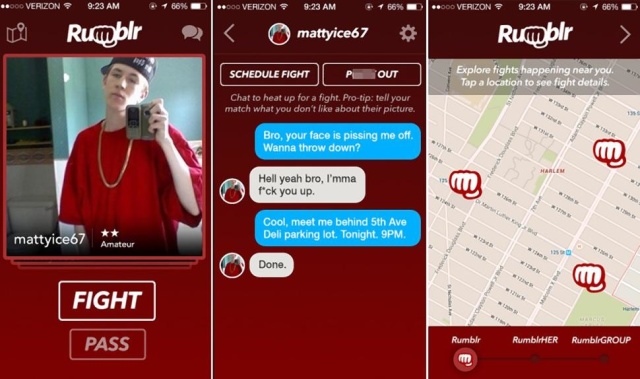It’s Mickey Mouse, mate. Spurious. Not genuine.
So go the words from Saul the pawnbroker to Bad Boy Lincoln in the movie Snatch.
We would be wise to remember those words when dealing with this crazy little thing called the Internet. In the past, fakes and lies have usually come knocking on our digital doors in the form of email scams and bloatware, but now they are coming through layers of binary bullshit so thick you need a silicon shovel just to keep your nose out of it.
Fake rumbling
I forget where I saw it first, but the phone app Rumblr was supposed to launch Monday. Billed as “Tinder for fighting,” the app was supposed to let users view profiles, communicate and then meet up for “casualty-free and casual fighting for free.”
The app turned out to be fake. There was nothing to launch. The whole thing was orchestrated by self-confessed college dropouts seeking to “showcase our branding skills.”
In the end, the dropouts’ ad agency “von Hughes” urges those truly interested in the app to unleash their aggression in other ways and encourages “fighting more pressing issues such as gang violence, domestic abuse, and at-risk youth culture.”
That’s a good message, but now I feel like punching someone.
Fake armies
A Dutch artist has enlisted the help of thousands of fake Facebook profiles he created to challenege the notion that “quantified social capital represents quality.” His critique of the social media giant’s profit-based machinations mimics an earlier work he executed via Instagram, in which he tried to give 30 different artists an equal number of followers (100,000).
The auteur’s medium of choice presents a case of art imitating life considering that presidential candidates’ Twitter followings were audited last month, revealing ultimately that Hillary Clinton and Donald Trump had the most fake followers, while Bernie Sanders has the most real ones.
Fake USB heists
Back when this site was first starting, NonDoc caught wind of an intriguing tale of digital kidnapping. The details went something like this: Two guys had made a movie and stored the thing on a USB stick. Someone stole that USB stick. Then, the thieves sent a ransom note to the filmmakers and demanded payment via bitcoins.
It’s Mickey Mouse, mate. Spurious. Not genuine.
Back when we thought the story was legit, we were leaning toward the prospect of covering it as an article for this site. Now that it’s known to have been a hoax/media stunt, we’re still covering it, but at least we weren’t trolled into oblivion during our first month outta the gates.
In conclusion …
Web literacy is a difficult thing, and it’s getting more difficult all the time. Now that the assaults to veracity come via sophisticated marketing campaigns for everything from philanthropic branding firms to presidential candidates, the common man or woman has little opportunity to avoid becoming an unsuspecting pawn in a game of media manipulation.
We’ll keep trying to dig up the truth, though.






















